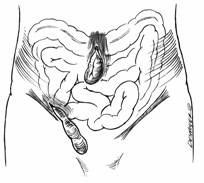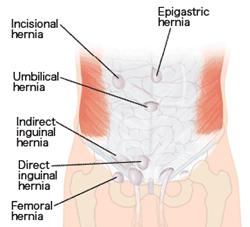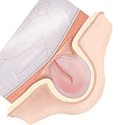GENERAL SURGERY
Abdominal Surgery
Hernia
 A hernia is a weakness in the wall of your abdomen. When you lift a heavy load, or when pressure in the abdomen increases, as when you cough, abdominal organs and tissues push against the wall. If the pressure is enough, they can push though at the weak spot, bulging out in a lump that you may be able to feel under your skin. This is not always painful, and you may be able to push the lump back inside then it is called a reducible hernia.
A hernia is a weakness in the wall of your abdomen. When you lift a heavy load, or when pressure in the abdomen increases, as when you cough, abdominal organs and tissues push against the wall. If the pressure is enough, they can push though at the weak spot, bulging out in a lump that you may be able to feel under your skin. This is not always painful, and you may be able to push the lump back inside then it is called a reducible hernia.
Unfortunately, weak areas in your abdominal wall do not heal on their own but usually become weaker with aging and activity. If part of your intestine protrudes through a hernia, it can become trapped (incarcerated), strangling the intestine and causing a bowel obstruction. This can become a life-threatening situation, requiring emergency surgery to repair the damage. Thus, it is best to treat and repair a hernia before an emergency arises.
 The abdominal wall is made up of layers that provide strength, including muscle, fat, connective tissue, and peritoneum. The most common kinds of hernias are called inguinal, umbilical, and femoral, because of the natural weak spots in the wall in those locations: the inguinal (groin), umbilical (naval), and femoral areas (just below the groin). A fourth common kind of hernia is an incisional hernia, which occurs where the incision from a previous surgery has created a weakened area. A less common condition is a hiatal hernia which occurs at the top of the stomach, when a weak spot in the diaphragm allows the stomach to move up into the chest cavity.
The abdominal wall is made up of layers that provide strength, including muscle, fat, connective tissue, and peritoneum. The most common kinds of hernias are called inguinal, umbilical, and femoral, because of the natural weak spots in the wall in those locations: the inguinal (groin), umbilical (naval), and femoral areas (just below the groin). A fourth common kind of hernia is an incisional hernia, which occurs where the incision from a previous surgery has created a weakened area. A less common condition is a hiatal hernia which occurs at the top of the stomach, when a weak spot in the diaphragm allows the stomach to move up into the chest cavity.
What Causes a Hernia?
 Most hernias in adults result from strain on the abdominal muscles, as when you lift a heavy object, although sometimes the problem is present from birth (a congenital hernia). Hernias can also result from a marked weight gain, when constipation leads to straining during bowel movements, or even from repeated coughing attacks.
Most hernias in adults result from strain on the abdominal muscles, as when you lift a heavy object, although sometimes the problem is present from birth (a congenital hernia). Hernias can also result from a marked weight gain, when constipation leads to straining during bowel movements, or even from repeated coughing attacks.
Diagnosing a Hernia
Although many hernias are easy to detect and diagnose during a clinical exam, your doctor may send you for an ultrasound or X-ray that will pinpoint the weakness or gap, or to rule out other causes of a suspicious lump.
Surgery for Hernia Repair
Surgery is the necessary treatment for a hernia. If left untreated, the intestine may become trapped in the hernia, causing strangulation. This leads to severe pain and may cause intestinal obstruction or death to the intestinal tissue, which is a medical emergency.
A hernia repair, or herniorrhaphy, is surgery to repair the weakness in the abdomen. Your surgeon will either suture the area closed or apply a piece of mesh as a patch.
